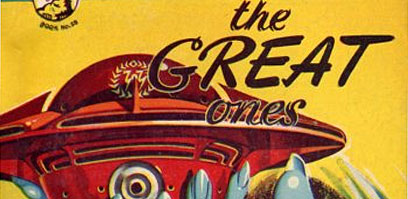
Somehow, I missed this when it first went up: The Forager Blog: Ron on Sci-Fi, Sean on Sci-Fi. This article is written by Jon Hastings, a player of Shock: and interesting guy. In it, he talks about my definition of science fiction (which, instead of writing in prose, I wrote as a game) and Ron Edwards’ take on it. Lemme quote Ron because he says some really nice things:
Anyway, to someone whose thinking inclines in the above direction, Joshua A. C. Newman is bucking for hero status. He is the only person with the guts to tackle this issue in RPG terms…Shock is a first, a de novo, an innovation. But more than merely an innovation, it’s not only what I wanted, but what I needed. In this day and age, I am not going to get science fiction consistently anywhere else. The person typing this post is Shock’s target audience.
… that is, Ron and I see this exactly the same way.
Now, I love SF short stories. Naturally, I have a great fondness for those read in my youth. Some authors really felt like they were talking to me. Bruce Sterling was one of them; he’d always thought about the same things I’d thought about and thought about them further. Ron, though, is ten years or so older than I (though you wouldn’t know it to look at him), so it comes as no surprise that he pegs optimal sci fi about ten years earlier than I do.
And that’s great. Because Shock: is for making your science fiction. It doesn’t reproduce science fiction. It’s a tool for making your own with your own aesthetics and your own moral connundra. It is not the product of scholarly study of science fiction; rather, it’s a technique I developed to make science fiction. I’m a designer, not a writer (a fact noted by so many), so I designed a science fiction system so I could tell the stories I wanted to tell.
This last point here came from a discussion I had with someone on RPGnet. In it, he asked me if I’d read his favorite couple of authors. I hadn’t. Later, he told someone else, when asked about Shock: that “the author doesn’t seem to know as much as he thinks he does.” Another person expressed concern that my sources listed were all “older” authors (Bruce Sterling is an old author! That makes me feel old!) That baffled me: one’s ability to build fiction is not based on how much other fiction one has read, it’s based on the number of stories told. I wrote Shock: so that those stories could have a structure — one that I recognize in the stories I like and one that I think works very, very well — and you can bring your aesthetic and moral machinery to the table and enjoy the process of creation.
Shock: is for your stories. Build what you want to build.
For the real hardcore SF fans, there’s a word that is being used: “Speculative Fiction”. http://en.wikipedia.org/wiki/Speculative_fiction
A lot of folks in the SF world who read a ton of shit found that the elements that they liked about SF wasn’t “spaceships and laser guns”, it was asking a question (“What if”), and then seeing the author take that question and create a world with it. More often than not, there is no *answer* to the question, just an exploration of a story set in that world. Try reading any Greg Egan (especially his short stories), recognized in those circles as *the* contemporary master of speculative fiction.
More and more folks on the hardcore SF circuits (like the indie congoer dudes of the SF world) have started flinching at the term science fiction, and embracing the term speculative fiction.
In any case, I saw somewhere where Ron called shock the “only” or “first” true science fiction game. That’s an extremely contentious and narrow statement based on what people consider to be science fiction. Science fiction doesn’t always ask “what if”, and lasers and spaceships over a backdrop of fantasy *is* SF.
But speculative fiction? Yeah, I’d say that shock is far more of a *speculative fiction* roleplaying game than a science fiction RPG. And you’re right, you provide the tools for people to make their own worlds.
Just something to think about.
Joshua – thanks for the link!
Reflecting a little more on what Ron said and risking going just a little overboard: I think games like Shock: and Ron’s own Spione are necessary in today’s day and age because the traditional producer-to-consumer media industry tries to tell us what kinds of stories should be meaningful to us. It’s refreshing to play a game like Shock: or Spione that give you the tools to make stories that are actually meaningful to you.
I can get carried away with my socio-political story-game evangelizing, though…
Carried away or not, I completely agree with you. The thing is, producer-to-consumer *isn’t* traditional. It’s just a ubiquitous marketing technique. What’s traditional is that everyone tells stories to each other and some people are really good at it, so you give them money or food or whatever to hear them.
For a long time, the tools we had to work with were RPGs and we fumbled along, using hammers for screws. Now that we’ve figured out some new tools, we’re fashioning fiction that is much more personally significant than mass media, precisely because it costs so little to produce.
I talked a little bit about this a year ago in my infamous post in which I dared to say that the Forge and its many groups of creators were groups of creators, helping each other make good things. Note in particular my points about A Scanner Darkly (which is actually the meat of the post).